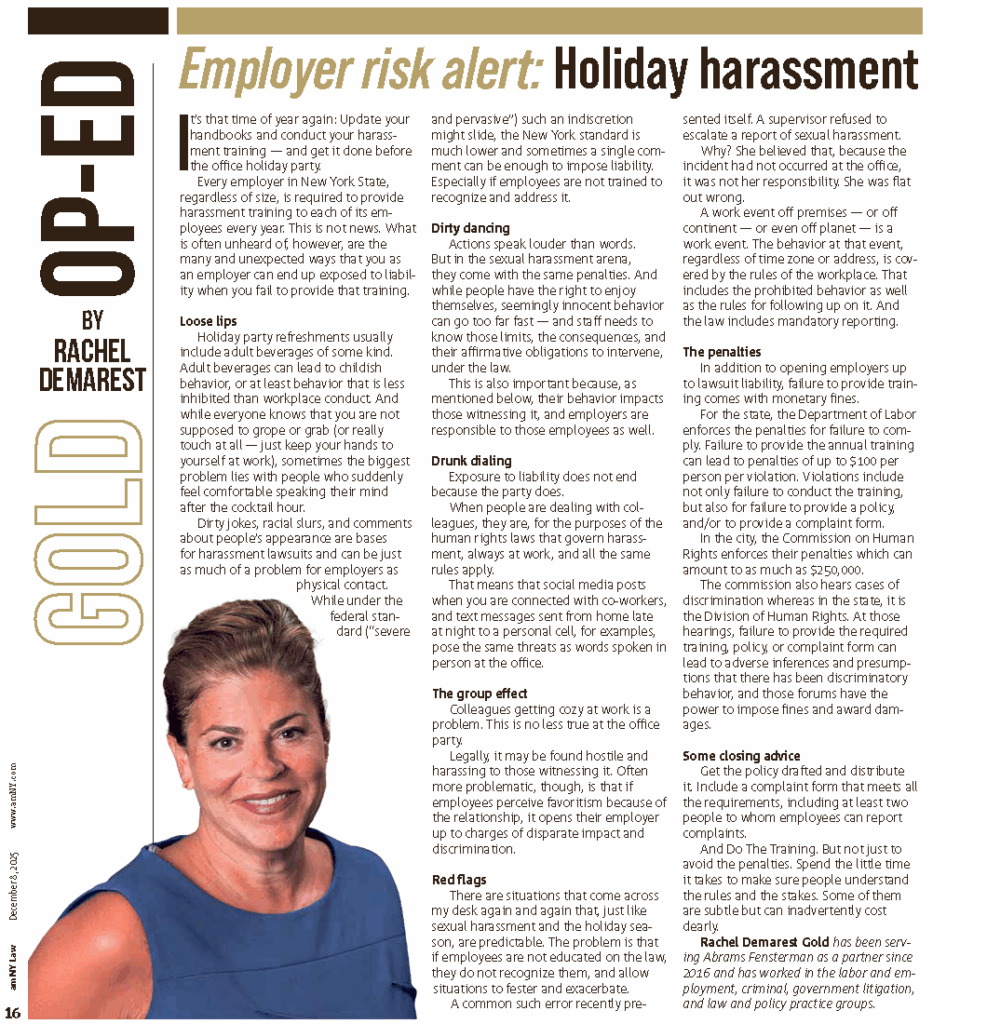By Justin Kelton
In one of its last decisions in 2019, New York’s highest court rejected a borrower’s attempt to avoid enforcement of a loan agreement on the basis that the loan that was “funded by illegal gambling proceeds.” Although it was undisputed that the loaned funds derived from a criminal bookmaking operation, the Court found that there was nothing wrongful about the loan agreement itself, and application of the “illegality” defense would provide a windfall to the defendant—who had directly participated in the gambling business. The decision in Centi v. McGillin,—N.E.3d—, 2019 WL 6898639 (Dec. 19, 2019) clarifies the limits of New York’s “illegality” defense, and confirms the Court’s strong preference for enforcing private agreements according to their terms.
The Parties’ Criminal Bookmaking Operation and the Loan Transaction
The parties in Centi v. McGillin were former friends who had operated an illegal gambling business together, for which both were convicted of promoting gambling. The plaintiff later brought a civil action claiming that the parties entered into an oral loan agreement in 2003, pursuant to which the plaintiff loaned the defendant $170,000 for the construction of the defendant’s new home. Centi v. McGillin, 155 A.D.3d 1493, 1494 (3d Dep’t 2017). For a time, the defendant made regular installment payments of cash in envelopes, but he eventually stopped making payments, leading to litigation.
At a nonjury trial in 2015, the plaintiff testified about the parties’ oral loan agreement, and admitted that “the source of the loan proceeds was cash obtained through his illegal bookmaking activities.” Id. at 1495. When questioned about whether he ever reporter the cash as income, the plaintiff asserted his Fifth Amendment right against self-incrimination. Id. A judgment was entered in favor of the plaintiff, and the defendant appealed to the Appellate Division, Third Department.
The defendant argued to the Appellate Division that the loan was unenforceable due to the illegal source of the funds loaned. The Third Department rejected the defendant’s argument, holding that “neither the agreement nor the performance of the agreement was illegal”. Id. (citations omitted). Thus, the court held that “the source and/or taxable status of the funds was not probative of the issue presented.” A Justice dissented, arguing that even though the loan was not “intrinsically illegal,” the fact that the money loaned derived from an illegal bookmaking operation meant that the loan constituted money laundering, and the agreement should therefore be void as a matter of public policy. Id. at 1496.
The Court of Appeals Holds that a Borrower May Not Use Illegality as “A Sword for Personal Gain.”
The defendant appealed to the Court of Appeals. The Court began by recognizing “our strong public policy favoring freedom of contract, agreements are generally enforceable by their terms.” The Court next noted that there was a finding below, supported by the record, that the parties entered into a bona fide loan agreement.
In analyzing the defendant’s “illegality” argument, the Court stated that there was nothing wrongful about the loan itself, and since both parties participated in the criminal conduct, public policy did not favor either side:
Although the loan was funded by the parties’ illegal gambling operation (for which both were criminally prosecuted), the record does not support a characterization of their conduct as “malum in se, or evil in itself” and the source of funds used for a loan is not typically a factor in determining its validity. Defendant argues the agreement should be deemed unenforceable because the courts should not assist a party in profiting from ill-gotten gains. But, here, where both parties were involved in the underlying illegality, neither enforcement nor invalidation of the contract would avoid that result.
Id. (citation omitted). In arriving at this conclusion, the Court relied on its prior holding in Lloyd Capital Corp. v. Pat Henchar, Inc., 80 N.Y.2d 124, 127 (1992), in which the Court rejected an “illegality” defense based on a purported violation of the criminal usury statute, and stated that if a criminal statute “does not provide expressly that its violation will deprive the parties of their right to sue on the contract, and the denial of relief is wholly out of proportion to the requirements of public policy.” Id. (citation omitted).
The Centi Court further explained that if the loan were not enforced, the defendant would receive a windfall despite his participation in the underlying criminal gambling operation. Therefore, the Court rejected the defendant’s “illegality” argument, reasoning that it was “reluctant” to reward “a defaulting party [who] seeks to raise illegality as ‘a sword for personal gain rather than a shield for the public good.’” While the Court cautioned that “we do not condone plaintiff’s illegal bookmaking business, for which he was prosecuted and fined,” it saw no reason to allow the defendant to profit from the circumstances.
The Takeaways
It is fairly common for parties seeking to avoid enforcement of an agreement to argue that the agreement is unenforceable due to some tangential misconduct. However, the Court of Appeals’ decision in Centi v. McGillin shows that the defenses of illegality and malum in se face significant judicial scrutiny. This is especially true where, as in Centi, the defense asserted might lead to an undue benefit for parties who participated in the misconduct themselves. Accordingly, contracting parties should not assume that the existence of some degree of criminal conduct by one or both parties will render the agreement unenforceable. Rather, the courts will carefully weigh the terms of the contract, the equities, and public policy in order to determine the viability of an illegality defense. Litigants should consult with experienced counsel to evaluate to what extent a party’s underlying purported misconduct may affect a loan agreement.
Justin T. Kelton is a partner at Abrams, Fensterman, Fensterman, Eisman, Formato, Ferrara, Wolf & Carone, where he focuses on complex commercial and employment litigation. He can be reached at 718-215-5300 or [email protected].
Reprinted with permission from the February 10, 2020 edition of The New York Law Journal, © 2020 ALM Media Properties, LLC. All rights reserved.
Further duplication without permission is prohibited. ALMReprints.com – 877-257-3382 – [email protected].





